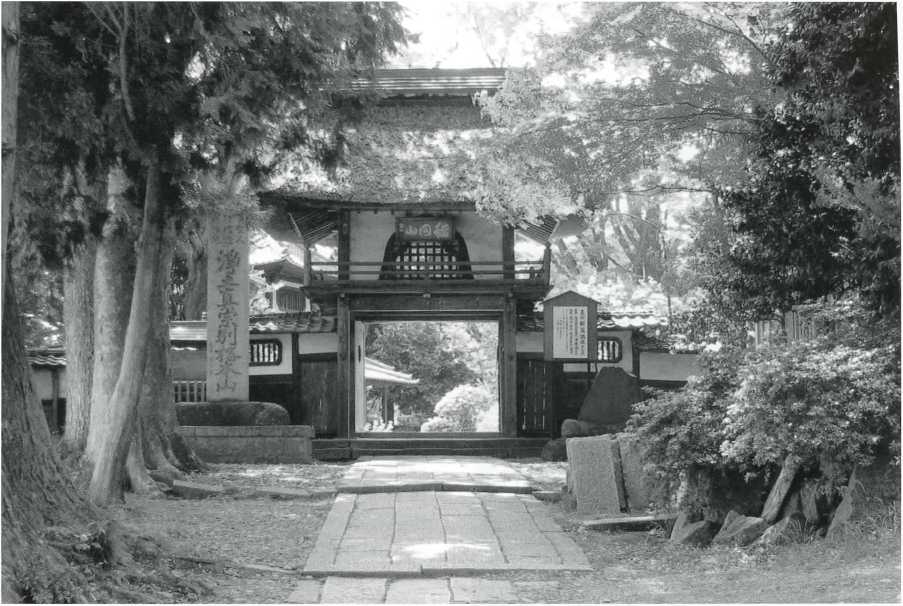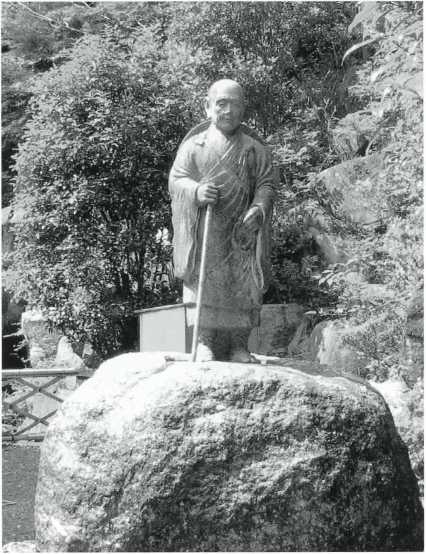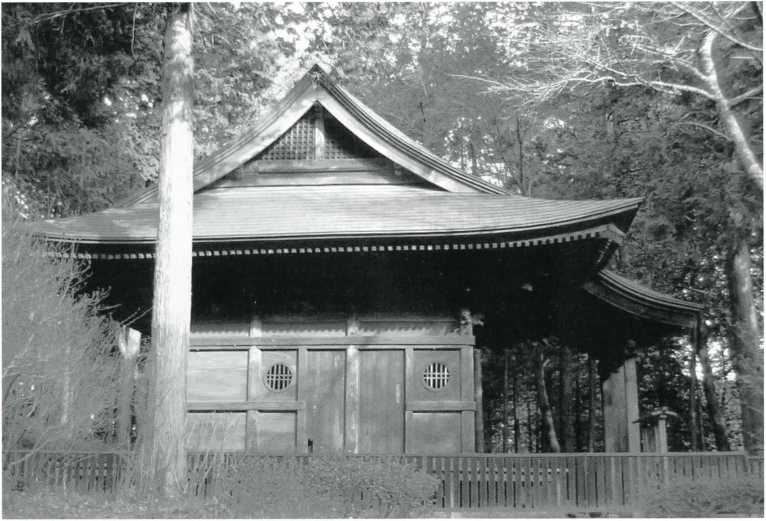Taitetsu and Mark Unno are father and son, both distinguished scholars and authors. They have taught a course on Shin Buddhism together for several years now at BCBS. This article is based on the most recent of those courses and on other writing they’ve done on the subject.
Tai:
When I was a 21-year-old senior at the University of California, Berkeley—many years ago—I had the opportunity to hear the famous Zen teacher D.T. Suzuki give a talk. Afterwards he invited anyone who wanted to ask questions to join him in another room for a discussion. After some hesitation, I asked, “What is karma?” Suzuki, who was 80 at the time, looked at me and said, “The elbow does not bend outward. This is what karma is explaining.” We all said thank you but had no idea what he was talking about.
After I graduated I moved to Japan to study Buddhism, partly because my father was a Shin Buddhist priest who encouraged me to explore Shin Buddhism, but also in some way to find an answer to this riddle of the elbow. I began thinking about it as a metaphor for karmic limitation. We have freedom to move, yes, but only in certain ways—the elbow bends, but only in one direction.
It is a koan, a Zen question, dealing with freedom and limitation. While we generally define freedom as being able to do whatever we want, in Zen that is not real freedom. Real freedom means living within the limitations on our experience of freedom, such as living and dying. After talking with different teachers, reading different works, and discussions with different people, I realized that the Shin Buddhist path is also dealing with the question of limitations and freedom.
Each tradition has its own language for this. In the Shin tradition we speak of our karmic limitations in terms of being “foolish beings”—bombu in Japanese. Understanding that I am a foolish being, which is understanding that the elbow only bends one way, opens the door to the freedom to express my true self, with all my limitations. This is how my freedom as a human being is to be realized.
Mark: Foolish beings
Our usual ideas about human nature might be based on science, as in evolution, or philosophy, as in Descartes’ “I think, therefore I am,” or some notion of the best that humans can be—skilled surgeons, dancers, athletes, or moral leaders. But whatever that part of human nature might be, it can not be the whole story. What about those who have the potential to achieve, but do not have the good fortune of the right circumstances, such as finances, freedom from injury, good counsel from a teacher or coach? So the desire, the impulse, the potential to be a certain kind of human being can not be all there is to human nature.

In Shin Buddhism, the largest development of Japanese Pure Land Buddhism, being a foolish being is the other aspect of human nature. It has to do with our karmic shortcomings as human beings. We do not use words like “evil person,” or “unenlightened person;” we use the more forgiving term “foolish being.” The expression is coupled with great compassion for ourselves and for others; it is not meant for us to punish ourselves inwardly for this nature, but to take ownership for our full humanity. When we do this, we can look at ourselves and others with more humor and gentleness, more awareness and compassion.
We have to keep in mind that this awareness is not easy. It is easy to ascribe foolishness to other people rather than to oneself, by saying, for example, “He is a foolish being, but not me.” But in our tradition, the more deeply I enter into the teaching, the more fully aware I become of myself as a foolish being. Other people are leading their own lives constructively and creatively, but I keep stumbling, making mistakes, making false claims of understanding, and so on.
Tai: Transformation
But there is another term always attached to this awareness of foolish being: transformation. By listening to the teachings we do not become wiser and wiser, or more and more enlightened. We come to realize more and more our own foolish nature, our unenlightened self. As we deepen that awareness, a transformation is gradually occurring. While keeping the awareness of foolish self, at the same time one is able to live life with a deep sense of gratitude and appreciation to all of life, to all other beings. Behind the awareness of foolish being there is the transformation of foolish being into its opposite, one who truly becomes a disciple of the Buddha, one who truly lives the Buddhist life. We listen to a teaching, we chant a sutra, we bow before the Buddha, and in that process, the transformation occurs naturally and spontaneously.
The Japanese Shin people use many examples from nature to illustrate this transformation. One is the fruit, persimmon, which is common in Japan. They ripen in the autumn, but if you pick them too early, the taste is very bitter. If you wait until it is fully ripened, it is very sweet. So it makes a perfect model of the gradual transformation that Shin people try to live by. Another metaphor for transformation very common to Shin Buddhism is ice and water. The founder of our tradition, Shinran, wrote many poems focusing on this one point. The more ice is bathed in the light of compassion, the more it becomes the flowing water of reality. Ice is a metaphor for my basic nature: hard, brittle, critical of others, always putting myself on top of others. If people criticize me, I have sharp edges, a very brittle ego. The teaching reveals that there is nothing wrong with the hard crust of ego, nothing “wrong” with blind self-centeredness, but they must be revealed within the light of boundless compassion.
The more ice is bathed in the light of compassion, the more it becomes the flowing water of reality.

This light, in our tradition, is always warm. It is all-embracing, helping us slowly and naturally change from a self that is always thinking of itself first, to a self that is happy, that is ready to do things for others naturally. The great gift of transformation is granted to us by the light of compassion, by the workings of Amida Buddha and the teachings of Shinran.
Mark:
I have my own elbow story. I was born in Los Angeles, but my parents took me to Japan when I was two years old because my father was continuing his studies in Tokyo. We lived in Japan for seven years. I went to Japanese kindergarten, Japanese public school. We came back to the United States when I was eight years old. Although my mother spoke to me in English while we were in Japan, and I thus had some ability to hear it, I basically spoke Japanese and had many challenges with English. Fortunately I had some very good English teachers and overcame the difficulties.
Looking back on it now, I realize that my struggle was not so much with the grammar and vocabulary of the language, but with the very different cultural constructions of meaning. As an example, I remember being assigned four or five books to read over the summer before my senior year at Northampton High School, which we were expected to report on when school resumed. We were given little green booklets, and our teacher wanted us to write as much as we could fit in these exam booklets about what we learned from the books we read. One of the books was Catch-22 by Joseph Heller, which I enjoyed because it was racy.
But I had no idea what I was going to write about these books, because while they were entertaining, I did not understand anything about them. The culture was completely alien to me. For each book I was only able to write one paragraph or so, which said something like, “This book is about what you should not do when you grow up to be an adult.” That’s it. The teacher was very kind; she gave me a “C,” but that was devastating to an over-achiever like me.
To regain our balance we have to realize our foolishness.
After seeing what I wrote, the teacher called me into her office and said, “Mark, what I want you to do this year is to read Japanese novels in English translation.” So I read Snow Country by Kawabata, a Nobel-Prize winner in literature; I read Mishima, Abe, authors’ names I got from her and from my parents. Writing about Snow Country, I said “This book is a study in human psychology, but it is really more about Japanese aesthetics, about nature and asymmetry.” I had all kinds of things to say, because it was all in my cultural matrix. Reading Catch-22, I was trying to bend the elbow outward; it was not my natural terrain. Within the context of my own cultural literacy, I found the freedom to express myself.
Universal language
The language of Buddhism is a universal teaching, and yet each of us brings our own particular cultural history, our own karma, to the way in which we engage it. Each of us must find the perfect freedom that comes from the elbow that does not bend outward. When we do, it is like water that begins to flow. We feel more at ease and at home with ourselves. We start to become released from having to struggle so hard, going against the current.
The Buddhist perspective actually goes against the current of a society that tries to socialize us as adults. Society tries to bend the elbow outward, away from our deepest, truest inclinations. There are many ways to express this; for example, we start to become top-heavy. We live in a highly intellectualized global culture; this is certainly true in my own work as a professor at the University of Oregon.
There is a saying in academia: “Those who can’t, teach.” It is a bit tongue-in-cheek, but like so many sayings, there is more than a kernel of truth in it. It means, “Scholars are often people who end up in universities because they aren’t able to deal with the practical realities of the world.” So promotion time is especially hairy in the academic world, because if we don’t get promoted it’s difficult to stay in the profession. Professors feel they are going to be completely lost then, because we can’t “do anything.” Academic cocktail parties are probably among the most awkward social occasions. We cultivate melon-sized brains, and because we don’t attend to the heart and to the spirit, pea-sized hearts.
In some ways this is the inheritance of our species: our brains outrun our hearts. We become all excited about discoveries in physics or manipulating genes before we take heartful responsibility for the kinds of inventions that we are about to make. But we are not fundamentally defective as a species; deep down we are capable of great heart, great compassion.
Buddhism is a path, in part, to undo the bad socialization, to help us regain the balance between mind and heart, body and spirit. As a species we have crammed so much knowledge into our brains that to regain our balance we actually have to empty out the mind and fill our hearts. What the Buddha discovered, what the Shin path discovered, is that we do this by realizing our own foolishness.
We scholars can get into a heated debate over the meaning of a comma in a dense academic tome that perhaps only forty people in the history of the world will ever read. We are absolutely convinced that we are right, because we are rational, but it’s really not rational at all. In the heat of the moment, nobody cares about the stupid comma; it’s all about whether I win or you win. That is our foolishness. To regain our balance we have to realize our foolishness. If we can break out laughing about the comma, then we can begin to fill our hearts.
Bending inward
We all have this ability to recognize our own foolishness in one form or another, because it is inherent to our deepest experience as human beings. You can all probably remember times as children when you felt free; you were not trying to bend the elbow outwards. You were one with the wind, the sunshine. In these childhood moments, you were in balance, in sync, aware, and bathed in the oneness of the universe. One of the things that coming to a course like this enables us to do is take time out and realize how imbalanced we have become, how top-heavy. Our minds are filled with thinking we are too good, or we are too bad, or we are mediocre. All of that is irrelevant to our deepest nature.
Regardless of its particular form, it is everything it needs and was meant to be.

When we see flowers in our yard, we see tall daisies, short daisies, daisies that are full, daisies that are tiny, daisies that bloom for many days and daisies that bloom only for one day. But they are not comparing. They do not say “I’m the most beautiful one of all,” or “I’m the tallest,” or “I live the longest.” Each one is simply manifesting its own particular daisy.
When we can come to simply manifest our own particular natures, each of us can attain the beauty, the freedom, of each daisy in the field. But we must recall this from deep within. If you watch a flower come up from a sprout, there is something impeccable about the way it manifests itself. There is no waste, no rudeness, no excess. Regardless of its particular form, it is everything it needs and was meant to be. We have that same impeccable character deep within us, along with the desire to realize who we are. We have the desire to leave behind all the rationalizations by which we imprison ourselves, and to manifest the perfect freedom of the elbow that bends inward. This is our karmic nature, our Buddha nature.
Just like a daisy sprouting forth and blooming and dying and then becoming fertilizer for the next generation, it is an organic process. It is irresistible, natural. It cannot be forced, but neither can it be held back. Yet, we must listen closely, watch closely. It is so easy to get distracted. It is fine for us to start a conversation with a friend we have not seen since last year, but we must remember to return to our own impeccable nature. We return to karmic awareness, to the realization that the elbow does not bend outward. By returning to our foolish selves, we return to boundless awareness, boundless compassion. We have a precious opportunity to do it together.